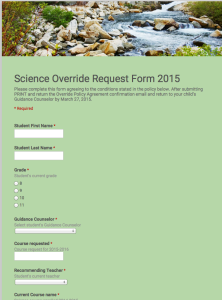By Michael Tricca
Staff Writer

Recently, a change was made to the course selection process. The new policy limits the number of courses that may be overridden to two, and does not allow a course to be overridden if the student has an average over six points below the minimum.
This new process adds a few restrictions that the deans and guidance staff hope will allow for students to perform better in overridden classes, classes that students were not originally recommended by teachers to be placed in. The change also aims to put in perspective the way students and their parents should seek to narrow one’s interests.
“Our real goal in the end is to help the students have balance […] it may feel like we’re putting restrictions in [students’] way but in reality we’re trying to help [students] make good decisions for [themselves] to have a healthy and balanced year,” said Guidance Coordinator Wendy Pechacek.
Much thought went into the decision; the idea was put through by Principal Antonelli, along with the deans and curriculum coordinators, who kept track of the progress of various randomly-picked students who were noted for having many overrides.
“Mrs. Coughlin [math curriculum coordinator] was very instrumental in gathering the data for that, because she’s been tracking that for several years now; who [which students] can do okay and who struggles”, said Pechacek.
It was found that students who filed more overrides tended to struggle more in their classes, especially when it was an override in an area they were not ideally suited for academically, or when they over-rode into more than two separate classes.
“Beyond five to six points [behind the requirement] was where you saw kids really not being able to get out of the ‘C’ range”, Pechacek said.
It was also found that an intense class schedule was not necessarily the choice of a student themselves.
“We found almost across the board [parents] didn’t feel their students were working as hard as they could and so they pushed to have them override, and in some cases the student didn’t have the ability to be stepping it up like that,” said Pechacek. “And in other instances it was because they had other things going on that made it difficult for them to take on that level of work.”
Guidance counselors tend to find people will protest if they are denied options, however Pechacek said their intentions are good and based on data. She said the changes are not in any way meant to put a roadblock in the way of students’ success.
“Going into senior year, [students] are going to be picking lots of electives, and hopefully picking the ones that [they] really like, and not just the ones that will have a higher weight for the GPA,” said Pechacek.
College is about focusing on one’s interests, and the school just wants to help students get started along that road and hone in on what they’re passionate about.
“I expect where there’s new guidelines there are going to be people who challenge that, […] and I think that’s healthy […] I just really want people to understand that the intention behind it is because we care about our students,” said Pechacek.






